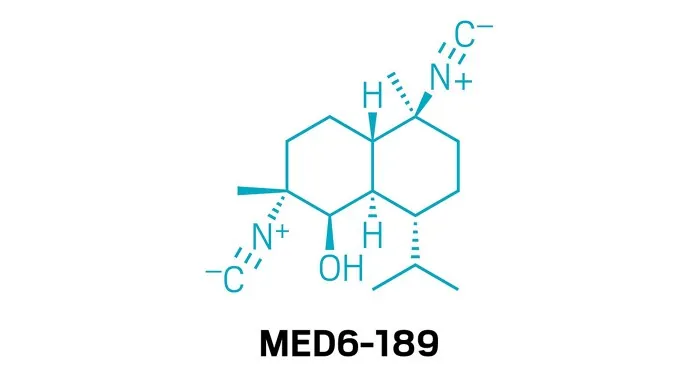
Sponge-derived Natural Products Give Rise to Groundbreaking Antimalarial Treatment
2024-10-01
Author: Wei
Malaria, a life-threatening disease caused by parasites, has long posed a significant healthcare challenge, particularly in tropical and subtropical regions. Historical antimalarials have shown efficacy in combating this deadly illness. However, the persistent evolution of drug-resistant parasites has driven the urgent need for new treatments.
In an exciting development, researchers have uncovered a new small molecule that effectively suppresses malaria-causing parasites both in laboratory settings and in genetically modified mice that mimic human physiology. This breakthrough stems from a focus on a critical organelle within the parasite, leaving the chance of developing resistance to this new drug considerably low. The study detailing these findings was published in Science (2024, DOI: 10.1126/science.adm7966).
At the heart of this discovery are isocyanoterpenes—natural compounds sourced from marine sponges. These compounds are known for their antibacterial, antifungal, and antimalarial qualities. However, their complex chemical structures have posed challenges for practical synthesis in the laboratory. This limitation has led researchers, including Chris Vanderwal of the University of California, Irvine, to look for simplified analogs that maintain their therapeutic potency.
Working collaboratively, Vanderwal and his team successfully synthesized a derivative of a previously identified antimalarial isocyanoterpene called kalihinol B. Through this process, they created a novel small molecule named MED6-189, which retained the remarkable antimalarial properties of its predecessor.
The team carried out rigorous testing of MED6-189 against various strains of Plasmodium falciparum, the main culprit behind malaria in humans. Remarkably, MED6-189 inhibited the growth of both drug-sensitive and drug-resistant forms of the parasite in their in vitro studies, as well as demonstrating efficacy against two other Plasmodium species.
Additional research using a fluorescent probe revealed that MED6-189 specifically targets the apicoplast—an organelle unique to the parasite responsible for synthesizing fatty acids and essential molecules. Advanced analyses—including transcriptomic, metabolomic, and proteomic studies—indicate that MED6-189 disrupts multiple crucial pathways necessary for the survival of the parasites. Furthermore, in infected mouse models designed to simulate human blood circulation, MED6-189 showed significant effectiveness.
A particularly striking feature of MED6-189 is its resilience against the development of drug resistance. Typically, parasites can acclimate to small-molecule antimalarials within weeks of exposure. In contrast, P. falciparum required approximately 36 months of sustained drug pressure to exhibit any resistance to MED6-189—a testament to the compound's unique action on several biological targets rather than a single enzyme or pathway.
“What we achieved after three years is extraordinary; we only detected a slight resistance after immense effort,” stated Karine Le Roch, a biologist at UC Riverside and a co-leader of the study. "This extensive intervention likely explains the compound's robustness against resistance development.”
Next, the research team plans to advance their studies by testing MED6-189's effectiveness in nonhuman primates. They also intend to refine the synthesis process of this promising compound, as the current method is not economically viable for large-scale production. Moreover, investigating the mechanisms underlying MED6-189's action could pave the way for designing similar antimalarials targeting pivotal molecular pathways.
Ryan Shenvi, a synthetic chemist at Scripps Research, praised this research, stating, "This study highlights the critical role of natural products in biological innovation. It underscores the concept that while natural products provide a foundation, our ultimate goal is to advance their potential through productive synthesis.”
As the fight against malaria continues, MED6-189 stands out as a beacon of hope, opening new avenues for treatment in the ongoing battle against this relentless disease.



 Brasil (PT)
Brasil (PT)
 Canada (EN)
Canada (EN)
 Chile (ES)
Chile (ES)
 España (ES)
España (ES)
 France (FR)
France (FR)
 Hong Kong (EN)
Hong Kong (EN)
 Italia (IT)
Italia (IT)
 日本 (JA)
日本 (JA)
 Magyarország (HU)
Magyarország (HU)
 Norge (NO)
Norge (NO)
 Polska (PL)
Polska (PL)
 Schweiz (DE)
Schweiz (DE)
 Singapore (EN)
Singapore (EN)
 Sverige (SV)
Sverige (SV)
 Suomi (FI)
Suomi (FI)
 Türkiye (TR)
Türkiye (TR)